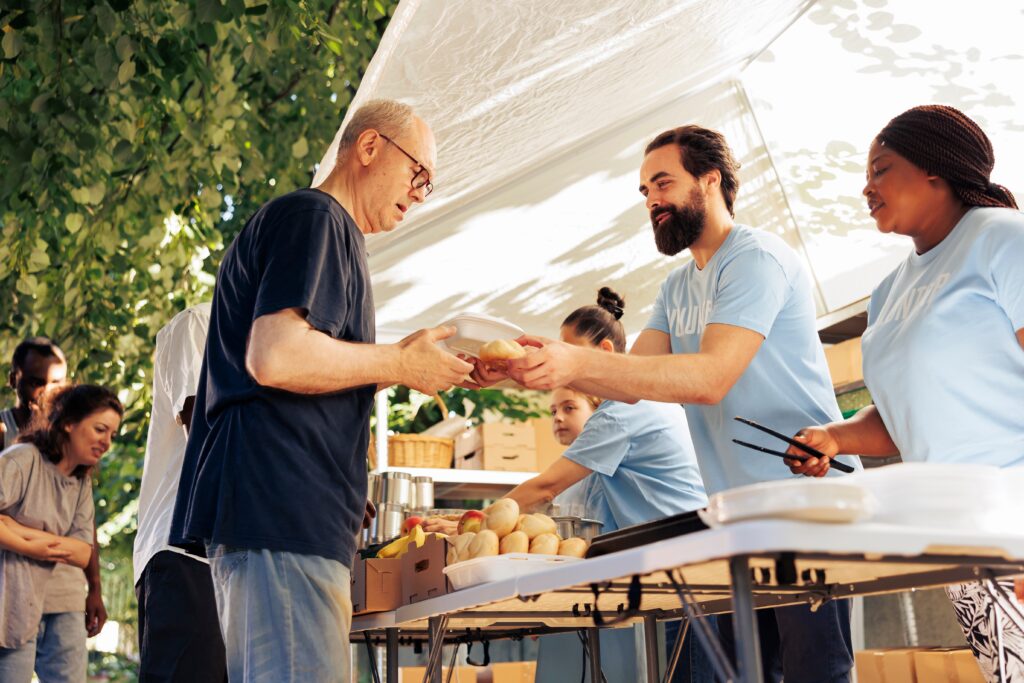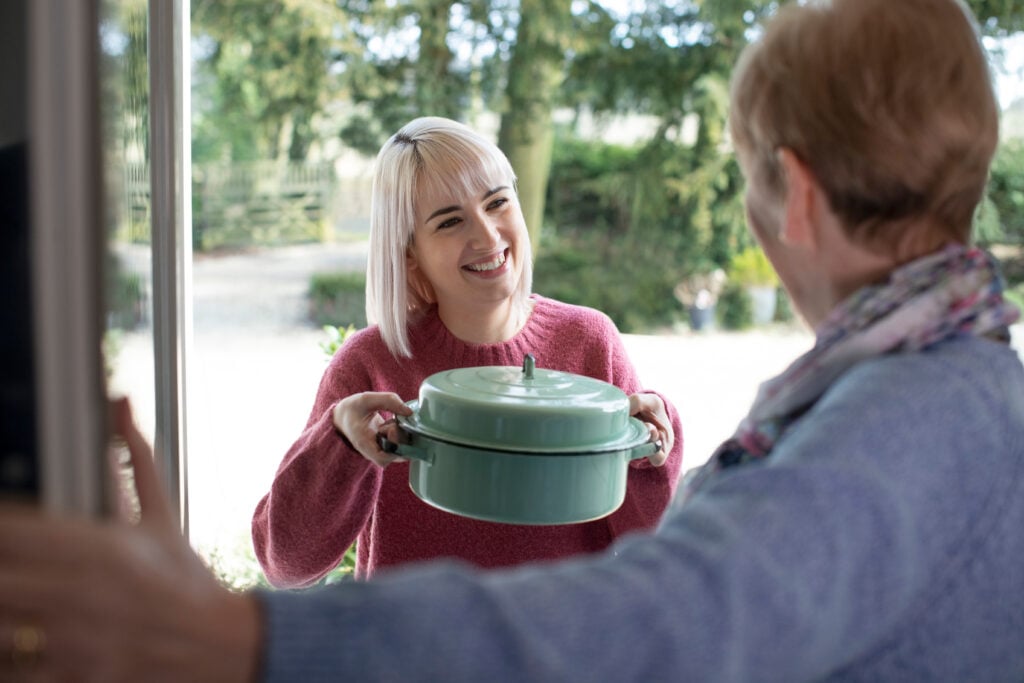Southern hospitality can feel like a warm hug—or a bit too much—for some Northerners.

There’s no denying the charm of Southern hospitality. Many Southerners pride themselves on being warm, welcoming, and polite, even to complete strangers. But what feels like everyday kindness below the Mason-Dixon line can sometimes come across as overbearing or puzzling to those from the North. The cultural gap between “bless your heart” and a straight-shooting “what’s up?” is real, and it can lead to some hilariously awkward moments.
Here are some ‘friendly’ Southern habits that often leave Northerners a little uncomfortable—and maybe even a bit charmed by the end of it.
1. Striking up conversations with strangers.

Southerners are known for chatting with just about anyone—standing in line, waiting for an elevator, or sitting on a park bench. What might start as a casual comment about the weather can easily blossom into a full-on conversation about family history, weekend plans, or the best BBQ joints in town. To a Southerner, this kind of interaction is as natural as sweet tea on a hot day, as stated by Rylan Miller of Business Insider.
For Northerners, who often prefer to keep public interactions brief and to the point, this level of friendliness can be a shock. They might find themselves wondering, “Do I know this person?” or “What do they want?” The truth is, most of the time, Southerners are just being, well, Southern. There’s no hidden agenda—just a genuine interest in connecting, even if only for a few minutes.
2. Using terms of endearment with everyone.

“Hey, sugar!” “What can I get you, darling?” “Thanks, hon!” In the South, terms of endearment are sprinkled into everyday conversations like salt on fried chicken. It doesn’t matter if you’re talking to a waitress, a neighbor, or the person at the drive-thru window—sweet pet names are fair game. For many Southerners, it’s just a way to add warmth and familiarity to interactions, according to Bold Voice.
But for Northerners, especially those who reserve pet names for close friends and family, it can feel a little strange. Hearing “sweetie” from a stranger might trigger a quick mental scan: “Do I know this person?” It can come across as overly familiar or even patronizing, depending on the context. Still, once they realize it’s just Southern charm at play, many Northerners learn to enjoy the extra dose of friendliness.
3. Bringing food as a greeting.

In the South, showing up empty-handed is almost unthinkable. When Southerners visit someone’s home, they bring food—often homemade and in generous portions, as reported by Jady Regard of Cane River Pecan. It might be a casserole, a plate of cookies, or a jar of pickled okra. This habit isn’t just about feeding people; it’s a love language, a way to show care and appreciation without needing to say a word.
Northerners, on the other hand, might feel caught off guard by this gesture. They may wonder if they need to reciprocate immediately or if they’re somehow failing as hosts. The idea of an unspoken “casserole debt” can create low-key anxiety. But once they understand the spirit behind it, they often find comfort in the tradition—and maybe even adopt it themselves.
4. Asking personal questions right away.

Southerners often cut to the chase with personal questions that might feel invasive to Northerners. “Who are your people?” “Where do y’all go to church?” “How’s your mama doing?” These questions aren’t meant to pry but to find common ground. Southerners love to make connections, and a few direct questions are often the fastest way to do it.
For someone not used to this level of openness, these inquiries can feel like crossing a line. Northerners may find themselves wondering why a near-stranger needs to know so much about their lives. However, this habit often comes from a place of genuine interest and a desire to create a sense of community—even if it can feel a bit much at first.
5. Inviting you over right away.

A Southern invitation to “come on by” can catch Northerners off guard. In the North, invitations are often planned in advance, with clear start and end times. But in the South, folks might invite you over for coffee, a meal, or just to sit on the porch without much formality. It’s not unusual to receive an invitation from someone you’ve just met—and they really mean it.
This casual hospitality can be a bit overwhelming for those who are more accustomed to keeping social circles tight and home visits to a minimum. The spontaneity of Southern hosting might lead to a bit of panic about what to bring or how long to stay. But over time, many Northerners find this open-door policy refreshing and appreciate the genuine hospitality behind it.
6. Staying much longer than expected.

When a Southerner comes to visit, they might settle in for a while. What starts as a quick visit can easily stretch into hours of conversation, often over a glass of iced tea or a piece of pie. The concept of “stopping by” in the South often means putting your feet up and staying a spell—hospitality means making guests feel like they can linger as long as they’d like.
For Northerners, who might be used to shorter, more structured visits, this can feel like a breach of unwritten social contracts. They may find themselves wondering when it’s polite to suggest that the visit wrap up. But to a Southerner, leaving too soon could seem rude. It’s a cultural difference that often requires a bit of adjustment on both sides.
7. Giving directions using landmarks instead of street names.

If you ask a Southerner for directions, don’t expect to hear about street names and exact mileage. Instead, you’re more likely to get instructions like, “Turn left where the old Kmart used to be,” or “Go past the big oak tree, then take a right at the red barn.” It’s charmingly local but can be a nightmare for Northerners who are used to GPS-friendly instructions.
This habit stems from the close-knit, story-rich culture of the South, where places are often tied to memories and local lore. For those unfamiliar with the area, it can lead to confusion and a few extra laps around the block. But if you can embrace the storytelling aspect of these directions, you might find they offer a unique glimpse into the community’s history—and eventually, you’ll learn to navigate like a local.
8. Saying “y’all” all the time.

For Southerners, “y’all” is the ultimate inclusive term. It’s a friendly and efficient way to address a group of people, whether it’s two folks at a coffee shop or a whole room at a family reunion. The word isn’t just about saving syllables—it carries a sense of warmth and approachability. It’s a way of making everyone feel seen and included, a verbal embrace in just one syllable.
Northerners, who are more accustomed to “you guys” or just “you,” might find “y’all” a bit jarring. It can take a moment to adjust to the idea that this single word covers everyone present. Some might even feel a bit like they’ve stepped into a movie set in Savannah or Nashville. But once the initial surprise fades, many Northerners find themselves adopting “y’all” too—it’s just that charming.
9. Offering unsolicited advice (with love).

Southern culture often emphasizes community and caring, which sometimes translates into giving advice—solicited or not. You might mention a sore throat, and suddenly you’re hearing about your neighbor’s granny’s honey-lemon remedy. Share a bit of trouble at work, and you might get a full strategy session over a glass of iced tea. Southerners genuinely want to help, and offering advice is a natural extension of that impulse.
For Northerners, this can feel intrusive. They might interpret it as overstepping boundaries or as a sign that their choices are being judged. In reality, it’s rarely meant to criticize. Instead, it’s a way of showing support and offering solutions based on experience. Once Northerners understand the intention behind it, they often find comfort in knowing that, in the South, people care enough to get involved.
10. Being overly polite, even when upset.

In the South, even conflict is often served with a side of politeness. Instead of outright confrontation, Southerners might use phrases like “I’d appreciate it if you could…” or “With all due respect…” These softened approaches can keep things civil but might leave Northerners guessing how someone truly feels. The famous “bless your heart” is a classic example—it sounds sweet but can carry a sting of condescension.
Northerners, who may be more accustomed to directness, might find this approach confusing. They could walk away from a conversation unsure if everything is genuinely fine or if they’ve just been subtly reprimanded. It’s a cultural difference that often leads to miscommunication, with Southerners aiming for gentleness and Northerners preferring clear-cut honesty.
11. Offering hospitality to the point of excess.

If a Southerner invites you over, prepare to be fed—and then fed some more. Even a casual visit can turn into a full meal, complete with dessert and a to-go plate. Southerners take pride in making guests feel welcome, often going above and beyond to ensure everyone is comfortable and well-fed. It’s not uncommon to leave with leftovers or a small gift as a reminder of the visit.
For Northerners, this can feel a bit overwhelming. They might worry about imposing or struggle with how to politely refuse the fourth helping of macaroni and cheese. While the generosity is genuine, it can also create a bit of pressure. The key is understanding that in the South, saying “no, thank you” is perfectly acceptable—even if your host insists a few more times. And once you find yourself on the receiving end of this kind of hospitality, it’s hard not to appreciate the love and care that comes with it.
